














|
|
Adventure enough for two!
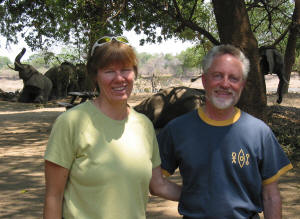 My
loving mwamuna wanga (aka my husband, Bill) arrived last Monday and
found his wandering wife just where he thought I’d be -- no expedition
involved, well unless you count the 42 hours of traveling. Bill even
recognized me despite my month in the wilds of Zambia. After all I
haven’t been quite as out of touch as poor Dr. Livingstone. My
favorite little frog disappeared the day that Bill arrived. I waxed
romantic and told Bill the frog left because he realized I’d already found
my Prince. Bill said “Or maybe the bathroom cobra ate him!” My
loving mwamuna wanga (aka my husband, Bill) arrived last Monday and
found his wandering wife just where he thought I’d be -- no expedition
involved, well unless you count the 42 hours of traveling. Bill even
recognized me despite my month in the wilds of Zambia. After all I
haven’t been quite as out of touch as poor Dr. Livingstone. My
favorite little frog disappeared the day that Bill arrived. I waxed
romantic and told Bill the frog left because he realized I’d already found
my Prince. Bill said “Or maybe the bathroom cobra ate him!”
I’ve reminded Bill of the clause in our
marriage contract that requires him to deal with any living creature bigger
than two inches with zero or more than four legs. That fine print
includes the gigantic cockroach wiggling in the bathtub and the even bigger
fuzzy gray spider in our bedroom. Those two made it outside alive,
unlike the tsetse fly inside our mozzie net that Bill dispatched with a shot
of Doom, the local insect killer, in his best great white hunter mode.
We both tried to rescue the little aquatic frog swimming in the toilet bowl,
but alas he swam the wrong way and had a real-life Mr. Toad’s Wild Ride.
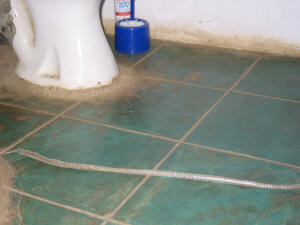 |
|
The "snake" on the floor of our
posh bathroom |
Bill is happy that he hasn’t had to live
up to the legless creature removal clause so far, though the souvenir snake
skin in our house gave us a fright when it was blown onto the floor of the
bathroom while we were away. Sadly, the local villagers have not been
so lucky lately. Yesterday, a young man hobbled into the clinic after being
bitten on the foot by a puff adder the night before. He had trouble
finding transportation from his village 40 miles away, and by the time he
arrived, his foot and leg were dramatically swollen and numb. We did
everything we could for him which meant giving a tetanus shot and injections
of two different antibiotics before sending him off to find transport to
Kamoto Hospital. Last night with only the night nurse at the clinic,
another man was brought in after a black mamba bit him on the leg.
Black mambas are the most feared snakes in Africa. Aggressive and able to
“stand up” two thirds of its nine to twelve foot body length the mamba with
its appropriately “coffin-shaped” head has a bite that is 100 percent fatal,
within as quickly as an hour of the bite, without antivenom treatment.
The closest available antivenom to reverse the neurotoxic effects of the
venom is at Chipata General Hospital, a hopeless three hour drive away.
The nurse said this father of five cried to see his children before he died,
but his family lived too far away. He was only 33 years old.
Lest you all think that the ground here is
crawling with poisonous snakes, I’ve learned that this father was
exceedingly unlucky since many people who have lived here all their lives
have never seen a mamba. Living here I am struck by our Western
perception of risk. We think nothing of driving down to Seattle on I-5, yet
ten times as many people (about 50,000) are killed in traffic accidents in
the US every year than die of snakebite in the world. If those 50,000
were dying of an infectious disease or snakebite we would be beside
ourselves with fright.
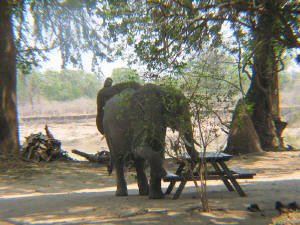 |
|
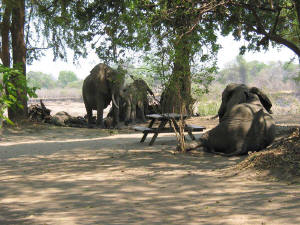 |
|
A nice place to rest a foot or a
trunk |
|
Elephant siesta in the shade |
Fortunately, my encounters with the
animals continue to be more entertaining than dangerous. The elephants
decided to have lunch on the trees between the Flatdogs office and the
restaurant yesterday, so I had to wait for them to move on before I could
get to my truck. Last week, the ellies decided to have a siesta by the
picnic tables in front of the dining room. Several of them were
sprawled out happily in the shade of the big sausage trees keeping us from
enjoying the nice shady spot. At breakfast we keep an eye out for the
baboon whom we found with his face in the sugar bowl when we walked away for
just a moment.
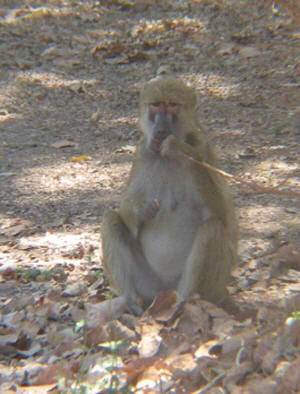 |
|
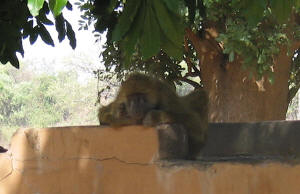 |
|
Baboon with a sweet tooth |
|
Waiting to make his move |
Being the doctor for the safari lodge guests and staff is the main reason I
can be here to enjoy these amazing animals. The mzungus suffer mostly
from gastrointestinal illnesses and fever that brings worries for malaria.
Just like family medicine back home though, I’ve seen people with everything
from a stress reaction from overwork to eye injuries to asthma. And
then there was the strange case of the naked Italian ... but that will have
to wait for another time.
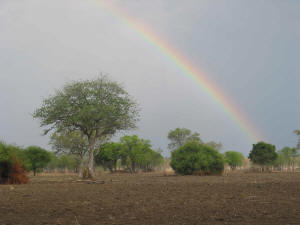 |
|
 |
|
|
|
Sunset on the Luangwa |
|

